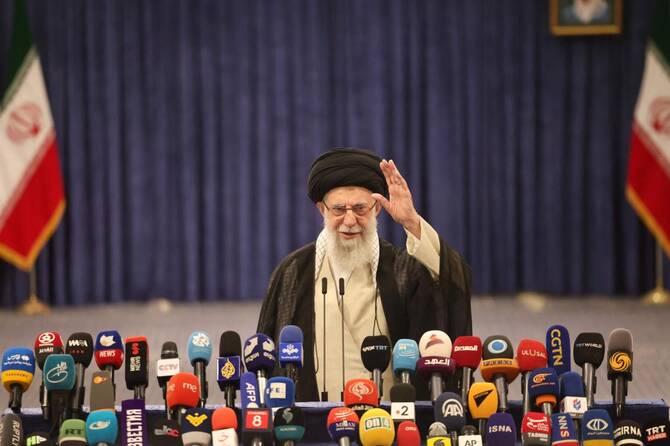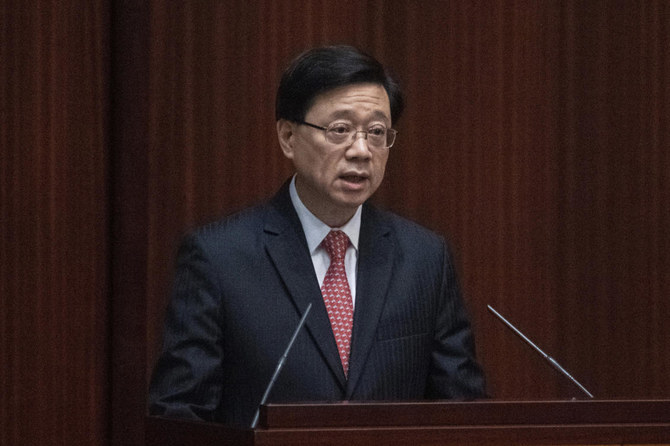HONG KONG: Hong Kong Chief Executive John Lee condemned an unusual rise in the number of withdrawal requests to the city’s organ donation system, saying Tuesday that police would investigate suspicious cases.
According to the government, the city’s centralized organ donation registration system received nearly 5,800 withdrawal applications in the five months since December, when the government raised the possibility of establishing an organ transplant mutual assistance program with mainland China. More than half of the withdrawal applications were found to be invalid, either as duplicate applications or coming from people who had never opted in.
At a regular press briefing, Lee pointed to those who withdrew their applications without ever registering, calling the moves suspicious.
“I severely condemn those who attempt to cause damages to this noble system which saves lives through organ donations,” he said. “This is a shameful act.”
The government also issued a strong-worded statement Monday, saying it could not rule out that a small number of people made withdrawal attempts in a bid to undermine the reputation of the system, and to increase administrative burden. Without naming any platforms or any individuals, it said it noticed a small number of people had distorted the virtue of organ donation by promoting the idea that donors should scrutinize the identity of the recipients online. Some also urged others to withdraw from the system, it added.
On Hong Kong’s Reddit-like forum LIHKG — where pro-democracy supporters discussed strategies for the 2019 anti-government movement — some users were skeptical about the proposed system. Others posted a link for making withdrawals from the register.
The government floated the proposal after a baby girl underwent the city’s first transplant using an organ donated from mainland China in December. It said the organ assistance program under consideration could be activated immediately after medical personnel could not match a donated organ with a suitable patient locally.
The political row over the proposed mutual assistance program reflected some Hong Kongers’ distrust of China’s health system, as well as their grievances toward Beijing, which has cracked down on the city’s pro-democracy movement with a sweeping national security law.
Hong Kong leader condemns suspicious uptick in registration withdrawals from organ donation system
https://arab.news/zdwsb
Hong Kong leader condemns suspicious uptick in registration withdrawals from organ donation system

- The government has been looking into setting up an organ transplant mutual assistance program with mainland China
- The city’s centralized organ donation registration system received 5,800 withdrawal applications between December and April
World leaders react cautiously to US and Israeli strikes, death of Iran’s Ali Khamenei

BRUSSELS: How long will it last? Will it grow? What will the conflict and the reported death of Iran’s Supreme Leader Ayatollah Ali Khamenei mean to us — and to global security overall? Those questions echoed across the Middle East and the planet Saturday as world leaders reacted warily to US and Israeli strikes on Iran.
US President Donald Trump said on social media that Khamenei was dead, calling it “the single greatest chance for the Iranian people to take back their Country.” Iranian state media said early Sunday the 86-year-old leader had died without elaborating on a cause.
Israeli officials previously told The Associated Press on condition of anonymity that Khamenei was dead. And Israeli Prime Minister Benjamin Netanyahu, in a televised address, said there were “growing signs” that Khamenei had been killed when Israel struck his compound early Saturday.
The apparent demise of the second leader of the Islamic Republic, who had no designated successor, would likely throw its future into uncertainty — and exacerbate already growing concerns of a broader conflict. The UN Security Council scheduled an emergency meeting.
Perhaps cautious about upsetting already strained relations with Trump, many nations abstained from commenting directly or pointedly on the joint strikes but condemned Tehran’s retaliation. Similarly to Europeans, governments across the Middle East condemned Iran’s strikes on Arab neighbors while staying silent on the US and Israeli military action.
Other countries were more explicit: Australia and Canada expressed open support for the US strikes, while Russia and China responded with direct criticism.
The US and Israel launched a major attack on Iran on Saturday, and Trump called on the Iranian public to “seize control of your destiny” by rising up against the Islamic theocracy that has ruled the nation since 1979. Iran retaliated by firing missiles and drones toward Israel and US military bases in the Middle East.
Some leaders urge resumption of talks
In a statement, British Prime Minister Keir Starmer, French President Emmanuel Macron and German Chancellor Friedrich Merz called on the US and Iran to resume talks and said they favored a negotiated settlement. They said their countries didn’t take part in the strikes on Iran but are in close contact with the US, Israel and partners in the region.
The three countries have led efforts to reach a negotiated solution over Iran’s nuclear program.
“We condemn Iranian attacks on countries in the region in the strongest terms. Iran must refrain from indiscriminate military strikes,” they said. “Ultimately, the Iranian people must be allowed to determine their future,” they said.
Later, at an emergency security meeting, Macron said France was “neither warned nor involved” in the strikes. He called for intensified efforts for a negotiated solution, saying “no one can think that the questions of Iran’s nuclear program, ballistic activity, regional destabilization will be settled by strikes alone.”
The 22-nation Arab League called the Iranian attacks “a blatant violation of the sovereignty of countries that advocate for peace and strive for stability.” That coalition of nations has historically condemned both Israel and Iran for actions it says risk destabilizing the region.
Morocco, Jordan, Syria and the United Arab Emirates denounced Iranian strikes targeting US military bases in the region including in Kuwait, Bahrain, Qatar and the Emirates.
Under former President Bashar Assad, Syria was among Iran’s closest regional allies and a staunch critic of Israel, yet a statement from its foreign ministry singularly condemned Iran, reflecting the new government’s efforts to rebuild ties with regional economic heavyweights and the United States.
Saudi Arabia said it “condemns and denounces in the strongest terms the treacherous Iranian aggression and the blatant violation of sovereignty.” Oman, which has been mediating the talks between Iran and the US, said in a statement that the US action “constitutes a violation of the rules of international law and the principle of settling disputes through peaceful means, rather than through hostility and the shedding of blood.”
Careful wording is (mostly) the order of the day
New Zealand refrained from full-throated support but acknowledged Saturday that the US and Israeli attacks were keeping the Iranian regime from remaining an ongoing threat. “The legitimacy of a government rests on the support of its people,” New Zealand Prime Minister Christopher Luxon and Foreign Minister Winston Peters said in a joint statement. “The Iranian regime has long since lost that support.”
Countries in Europe and the Middle East used careful wording, avoiding perceptions that they either support unilateral American action or are directly condemning the United States.
Others were more blunt. Russia’s Foreign Ministry called the strikes “a pre-planned and unprovoked act of armed aggression against a sovereign and independent UN member state.” The ministry accused Washington and Tel Aviv of “hiding behind” concerns about Iran’s nuclear program while actually pursuing regime change.
Similarly, China’s government said it was “highly concerned” about the US and Israeli strikes on Iran and called for an immediate halt to the military action and a return to negotiations. “Iran’s sovereignty, security and territorial integrity should be respected,” a Chinese Foreign Ministry statement said.
Despite recent tensions with the US, Canada too expressed its support for the military action. “The Islamic Republic of Iran is the principal source of instability and terror throughout the Middle East,” Prime Minister Mark Carney said.
And the UN Security Council scheduled an emergency meeting on the US and Israeli attacks on Iran, at the request of Bahrain and France.
Concerns expressed of ‘new, extensive’ war
Palestinians in the occupied West Bank said they were largely unfazed as war erupted Saturday, barely pausing as booms echoed across the sky from Israel’s Iron Dome intercepting missiles overhead.
Unlike Israel, Palestinian cities have no warning sirens or bomb shelters, despite the risk of falling debris or errant missiles. As people sheltered less than 10 miles (16 kilometers) away in Jerusalem, streets in Ramallah swarmed with shoppers browsing meat counters, vegetable stalls and Ramadan sweets, some stopping to record the sounds of distant sirens and missile interceptions.
But as Israel closed checkpoints to the movement of people and goods on Saturday, gas stations saw longer-than-usual lines as residents filled spare canisters in case of supply disruptions.
The Palestinian Authority, in a statement, condemned the Iranian attacks on Arab nations, many which have historically helped underwrite its finances. It made no mention of the Israeli or US strikes.
Nervousness is perceptible across multiple countries. Norwegian Foreign Minister Espen Barth Eide told Norwegian broadcaster NRK that he was concerned the failure of negotiations between the US and Iran meant a “new, extensive war in the Middle East.”
The Nobel Peace Prize-winning International Campaign to Abolish Nuclear Weapons condemned the US and Israeli strikes on Iran in harsher words. “These attacks are totally irresponsible and risk provoking further escalation as well as increasing the danger of nuclear proliferation and the use of nuclear weapons,” said its executive director, Melissa Parke.
EU leaders issued a joint statement Saturday calling for restraint and engaging in regional diplomacy in hopes of “ensuring nuclear safety.” The Arab League, too, appealed to all international parties “to work toward de-escalation as soon as possible, to spare the region the scourge of instability and violence, and to return to dialogue.”














